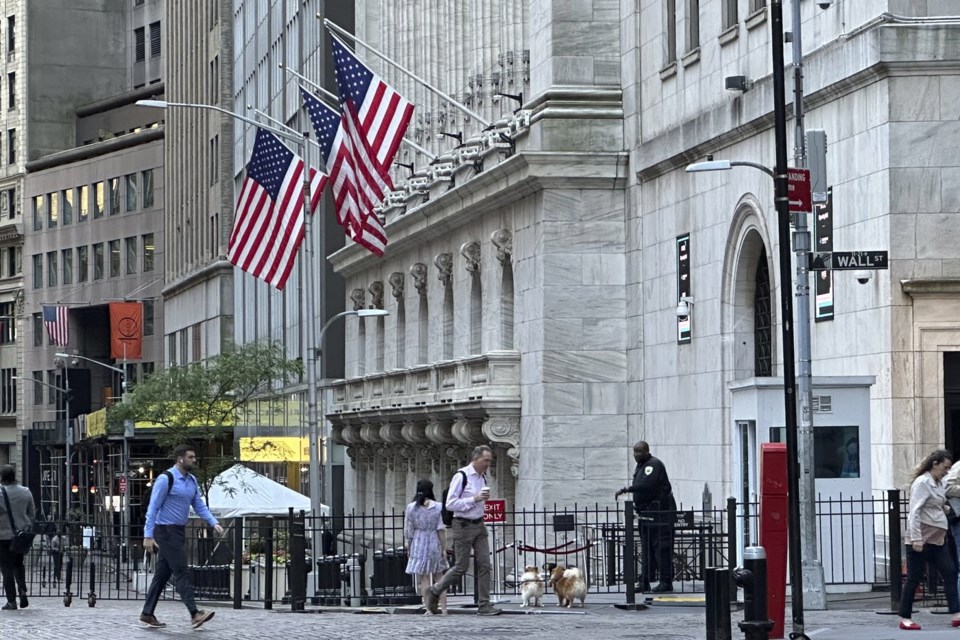NEW YORK (AP) — U.S. stocks closed lower under the weight of higher yields in the bond market. The S&P 500 fell 0.7% Wednesday, sinking further from its record set last week. The Dow Jones Industrial Average lost 1.1% and the Nasdaq composite fell 0.6% after setting its latest all-time high. American Airlines Group led a slump for airlines after cutting its forecast for profit and other financial targets for the spring. Another climb for yields in the bond market also weighed on the stock market broadly following an auction of $44 billion in Treasurys. The yield on the 10-year Treasury rose to 4.61%.
THIS IS A BREAKING NEWS UPDATE. AP’s earlier story follows below.
NEW YORK (AP) — U.S. stocks are sinking under the weight of higher yields in the bond market on Wednesday.
The S&P 500 was 0.6% lower in afternoon trading and falling further from its record set last week. It's trimming its gains for May, which had been on track to be its best month in six, and nearly 90% of the stocks in the index are falling.
The Dow Jones Industrial Average was down 391 points or 1%, as of 2:45 p.m. Eastern time, and the Nasdaq composite was 0.4% lower a day after setting its latest all-time high.
American Airlines Group led a slump for airline stocks after it cut its forecast for profit and other financial targets for the spring. It said fuel costs may be a bit lower than previously thought, but an important revenue trend would likely be as well. It also said its chief commercial officer, Vasu Raja, is leaving the company. It lost 14.7%.
ConocoPhillips fell 3.9% after it said it would buy Marathon Oil in an all-stock deal valuing the company at $22.5 billion, including $5.4 billion of net debt. It’s the latest big deal for an industry that’s seen several buyout announcements recently. Marathon Oil rose 7.8%.
Advance Auto Parts sank 9.8% after its results and revenue for the latest quarter came up just shy of analysts’ expectations. The retailer said the industry has had a slower start to the year than expected.
Another climb in longer-term Treasury yields also weighed on the stock market, and the 10-year yield rose to 4.61% from 4.54% late Tuesday following an auction of $44 billion in seven-year Treasurys. Worries have been rising that meh demand from buyers for Treasurys in such auctions will help drive yields higher.
The 10-year yield is still down for the month, but it’s been creeping higher since dropping below 4.40% in the middle of May.
Higher Treasury yields hurt prices for all kinds of investments, and they can pack a particularly hard punch on stocks of utility companies. When bonds pay more in interest, they can peel away income-seeking investors who might otherwise buy those stocks for their relatively big dividends. Utilities in the S&P 500 fell 1.4% as a group for one of the worst losses within the index.
This month's swings in Treasury yields have also come as traders recalibrate their expectations for when the Federal Reserve could begin cutting its main interest rate, which is at its highest level in more than two decades.
Wall Street always yearns for cuts to rates because they can boost prices for investments and remove downward pressure on the economy. But traders have had to delay their too-optimistic forecasts for rate cuts several times this year because inflation has proven stubborn to subdue fully.
The Fed is trying to pull off the balancing act of grinding down on the economy just enough through high interest rates to get inflation fully under control, but not so much that it leads to widespread layoffs.
A report from the Fed released Wednesday said that it's heard from businesses and other contacts around the country that consumers are pushing back against more increases to prices. That in turn is eating into companies' profits as their own costs for insurance and other expenses continue to rise.
Despite worries about cracks showing in spending by U.S. consumers, particularly those making lower incomes, economists at BNP Paribas expect a healthy job market, slowing inflation and even gains made by some investors in cryptocurrencies to help support the main engine of the economy.
“The US consumer has defied the gravity of high interest rates and inflation," as well as jitters about an uncertain economy, according to Yelena Shulyatyeva, senior U.S. economist at BNP Paribas.
The U.S. stock market has been continuing to set records despite worries about interest rates staying high in part because stocks related to artificial-intelligence technology keep rising. Nvidia’s latest blowout profit report helped drive the frenzy even higher, but momentum can’t last forever. Its stock fell in morning trading before flipping to a gain of 1.1%, which would be its weakest since its profit report a week ago.
On the winning side of Wall Street was Dick's Sporting Goods, which jumped 16% after topping analysts’ expectations for profit and revenue in the latest quarter. The retailer also raised its forecast for profit over the full year.
Chewy, an online seller of pet supplies, likewise reported stronger profit for the latest quarter than expected, and its stock jumped 26.1%. It also said it will return up to $500 million to its shareholders by buying back its own stock.
In stock markets abroad, indexes were mostly lower across Asia and Europe. Hong Kong’s Hang Seng fell 1.8%, South Korea’s Kospi dropped 1.7% and France’s CAC 40 fell 1.5%.
Stocks in Shanghai were roughly flat after the International Monetary Fund raised its forecast for China’s economic outlook, saying it expects the No. 2 economy to grow at a 5% annual pace this year. But it also warned that consumer-friendly reforms are needed to sustain strong, high-quality growth.
___
AP Business Writers Yuri Kageyama and Matt Ott contributed.
Stan Choe, The Associated Press

